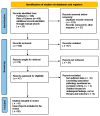Acute Mesenteric Ischemia in COVID-19 Patients
- PMID: 35011941
- PMCID: PMC8745985
- DOI: 10.3390/jcm11010200
Acute Mesenteric Ischemia in COVID-19 Patients
Abstract
Acute mesenteric ischemia is a rare but extremely severe complication of SARS-CoV-2 infection. The present review aims to document the clinical, laboratory, and imaging findings, management, and outcomes of acute intestinal ischemia in COVID-19 patients. A comprehensive search was performed on PubMed and Web of Science with the terms "COVID-19" and "bowel ischemia" OR "intestinal ischemia" OR "mesenteric ischemia" OR "mesenteric thrombosis". After duplication removal, a total of 36 articles were included, reporting data on a total of 89 patients, 63 being hospitalized at the moment of onset. Elevated D-dimers, leukocytosis, and C reactive protein (CRP) were present in most reported cases, and a contrast-enhanced CT exam confirms the vascular thromboembolism and offers important information about the bowel viability. There are distinct features of bowel ischemia in non-hospitalized vs. hospitalized COVID-19 patients, suggesting different pathological pathways. In ICU patients, the most frequently affected was the large bowel alone (56%) or in association with the small bowel (24%), with microvascular thrombosis. Surgery was necessary in 95.4% of cases. In the non-hospitalized group, the small bowel was involved in 80%, with splanchnic veins or arteries thromboembolism, and a favorable response to conservative anticoagulant therapy was reported in 38.4%. Mortality was 54.4% in the hospitalized group and 21.7% in the non-hospitalized group (p < 0.0001). Age over 60 years (p = 0.043) and the need for surgery (p = 0.019) were associated with the worst outcome. Understanding the mechanisms involved and risk factors may help adjust the thromboprophylaxis and fluid management in COVID-19 patients.
Keywords: COVID-19; SARS-CoV-2; acute mesenteric ischemia; cytokines; endothelitis; hypercoagulability; thromboemboembolism.
Conflict of interest statement
The authors declare no conflict of interest.
Figures
References
-
- Radovanovic N., Dumic I., Veselinovic M., Burger S., Milovanovic T., Nordstrom C.W., Niendorf E., Ramanan P. Fusobacterium necrophorum subsp. necrophorum Liver Abscess with Pylephlebitis: An Abdominal Variant of Lemierre’s Syndrome. Case Rep. Infect. Dis. 2020;2020:9237267. doi: 10.1155/2020/9237267. - DOI - PMC - PubMed
Publication types
LinkOut - more resources
Full Text Sources
Research Materials
Miscellaneous


